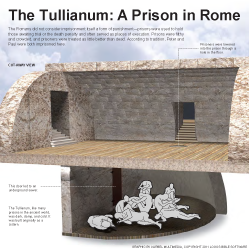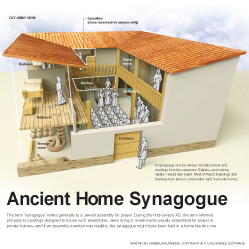4:1 Masters In Graeco-Roman society, masters assumed complete authority over their slaves and could freely mistreat them. Paul urges masters who are believers to use their authority with integrity; in God’s kingdom, they too are slaves, and God is their master (compare Eph 6:5–9).
4:2–18 Paul concludes the letter with final instructions and greetings. |
4:2 alert The Colossians must stay alert for false teachings that contradict the gospel message (Col 2:8). Jesus gave His disciples a similar warning prior to His arrest (Mark 14:38).
thanksgiving See note on Col 3:15.
4:3 praying at the same time Paul encourages the Colossians to partner with him in his preaching ministry through prayer.
 Prayers in Paul’s Letters Table
Prayers in Paul’s Letters Table
mystery of Christ Refers to God’s plan of redemption for creation and humanity (compare 1:26–27; 2:2; see note on 1:26). This mystery has been revealed through Jesus Christ and the teaching of His apostles.
a prisoner Paul wants the Colossians to understand that his imprisonment is a result of his gospel work, and that it demonstrates his love for them (1:24).
4:5 wisdom Paul refers to practical and transformational wisdom, not intellectual insight (compare 1 Cor 1:21, 27). Those who apply such wisdom can reflect God’s values and character.
not intellectual insight (compare 1 Cor 1:21, 27). Those who apply such wisdom can reflect God’s values and character.
4:6 seasoned with salt In the ancient world, salt was used to preserve food and enhance flavor. Conversation that is figuratively seasoned with salt is uplifting.
was used to preserve food and enhance flavor. Conversation that is figuratively seasoned with salt is uplifting.
4:7 Tychicus A believer from the Roman province of Asia, which included Colossae (Acts 20:4). While Paul was imprisoned, Tychicus delivered his letters to several churches in southwest Asia Minor (Col 4:16; Eph 6:21–22).
delivered his letters to several churches in southwest Asia Minor (Col 4:16; Eph 6:21–22).
4:9 Onesimus A slave who accompanied Tychicus to Colossae. Onesimus apparently had run away from his owner, Philemon, who might have hosted the Colossian church in his home (Phlm 2). Paul seems to have met Onesimus while in prison and now was sending him back to Colossae to be reconciled to Philemon (Phlm 10, 12).
apparently had run away from his owner, Philemon, who might have hosted the Colossian church in his home (Phlm 2). Paul seems to have met Onesimus while in prison and now was sending him back to Colossae to be reconciled to Philemon (Phlm 10, 12).
4:10 Aristarchus A missionary companion from Thessalonica (Acts 20:4). He was with Paul in Ephesus and Jerusalem and during his voyage to Rome (Acts 19:29; 20:4; 27:2).
from Thessalonica (Acts 20:4). He was with Paul in Ephesus and Jerusalem and during his voyage to Rome (Acts 19:29; 20:4; 27:2).
Mark, the cousin of Barnabas John Mark from Jerusalem (Acts 12:12).
from Jerusalem (Acts 12:12).
John Mark accompanied Paul and Barnabas during the first missionary journey, but returned home in the middle of it (Acts 13:13). The Gospel of Mark is commonly attributed to John Mark. When Barnabas wanted John Mark to accompany him on the second missionary journey, Paul refused. Because of this disagreement, Paul and Barnabas parted company (Acts 15:39). Mark later joined Paul in his missionary work, and Paul commended him to others (2 Tim 4:11; Phlm 24). |
4:11 Jesus who is called Justus Nothing is known of this man.
4:12 Epaphras A believer who likely planted the church at Colossae and perhaps also the churches at Laodicea and Hierapolis. Compare Col 1:7.
who likely planted the church at Colossae and perhaps also the churches at Laodicea and Hierapolis. Compare Col 1:7.
4:13 I testify to him The believers at Colossae probably were concerned about Epaphras. Paul reassures them that he continues to work for their benefit.
Hierapolis A commercial and military colony near Colossae and Laodicea in southwest Asia Minor. Hierapolis was known for its mystery cults.
4:14 Luke A missionary companion of Paul (see Acts 16:10 and note; 2 Ti 4:11); traditionally identified as the author of the Gospel of Luke and the book of Acts.
of Paul (see Acts 16:10 and note; 2 Ti 4:11); traditionally identified as the author of the Gospel of Luke and the book of Acts.
Demas Although he was with Paul at the time of this letter, Demas later deserts Paul and goes to Thessalonica (2 Tim 4:10).
later deserts Paul and goes to Thessalonica (2 Tim 4:10).
4:15 Laodicea See note on Col 2:1.
Nympha Probably a wealthy single woman or a widow, since she hosted a church in her home. Members of the early church typically met in homes (e.g., Rom 16:5).
4:16 letter from Laodicea Paul’s letter to the Laodiceans is unknown. One proposal is that it might be the letter to the Ephesians (which Paul may have sent to several churches), but there is no conclusive evidence for this claim. See note on Eph 1:1.
4:17 Archippus Mentioned only in this verse and in Phlm 2, where he is included as part of Philemon’s household. Archippus likely served with Paul at some point.
likely served with Paul at some point.
4:18 The greeting is by my hand Paul would have dictated his letter to a professional scribe. By writing the last line himself (and perhaps including a distinguishing mark), Paul confirms that the letter is from him.
Grace be with you Paul’s typical closing in his letters (e.g., Gal 6:18; 1 Thess 5:28).

|
About Faithlife Study BibleFaithlife Study Bible (FSB) is your guide to the ancient world of the Old and New Testaments, with study notes and articles that draw from a wide range of academic research. FSB helps you learn how to think about interpretation methods and issues so that you can gain a deeper understanding of the text. |
| Copyright |
Copyright 2012 Logos Bible Software. |
| Support Info | fsb |
 Loading…
Loading…



 John Mark
John Mark 
